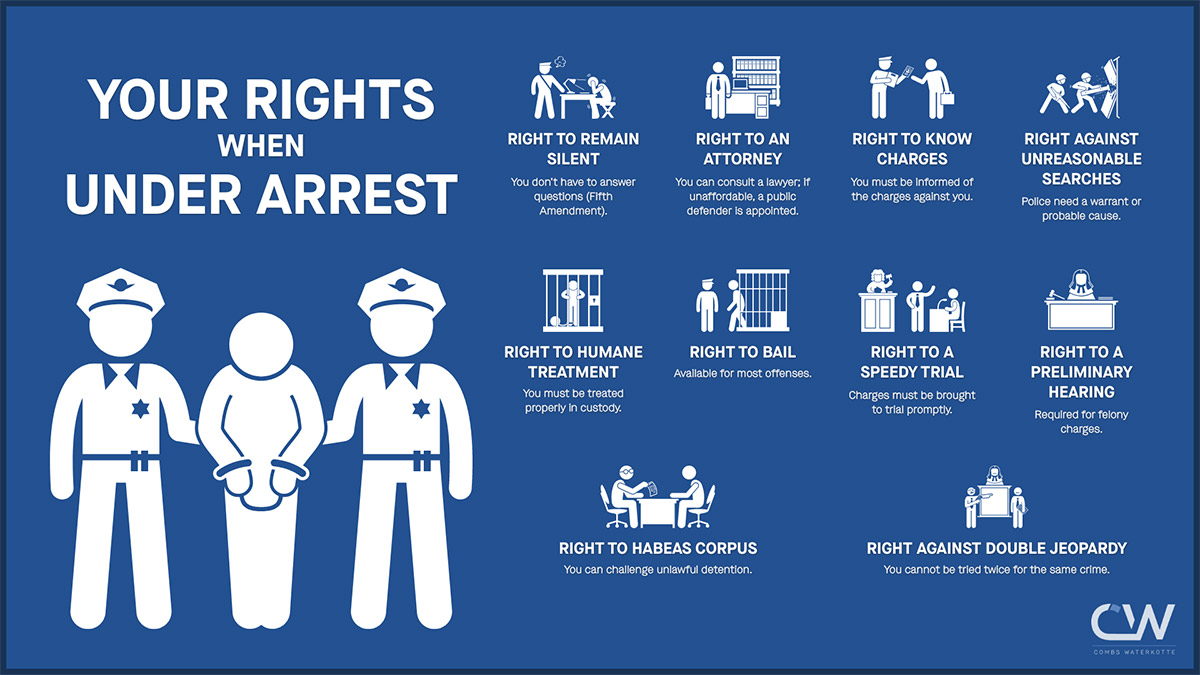Violent Crimes Lawyer Southern Illinois — if you’ve been arrested or you’re under investigation, you need clear answers and fast action. Our violent crimes lawyers in Southern Illinois defend people accused of offenses involving the use or threat of force and works to protect your freedom, record, and future from day one. At Combs Waterkotte, our Southern Illinois criminal defense team responds immediately and starts building your defense the moment you call.
At a Glance: Violent Crime Cases in Southern Illinois
- What counts as a violent crime in Illinois
- Common violent crime charges we defend
- Penalties and sentencing ranges
- How prosecutors approach these cases
- Defense strategies that work
- What to do if you’re arrested or under investigation
- Why clients choose Combs Waterkotte

Free book
How a Criminal Defense Attorney Can Protect Your Rights and Future
Combs Waterkotte has over 60 years of experience and over 10,000 cases handled. This ebook helps guide you through the criminal defense process and how an experienced, skilled defense attorney can keep your freedoms intact.
What Is Considered a Violent Crime in Illinois?
Illinois law (725 ILCS 120/3) defines violent crime as:
- any felony in which force or threat of force was used
- sex crimes involving exploitation, misconduct, or sexual penetration, or any other sex crime in 720 ILCS 5
- domestic battery or stalking
- violation of an order of protection (restraining order) or a no-contact order
- any misdemeanor that results in death or great bodily harm
- any DUI, reckless homicide, or similar vehicle offense that results in personal injury or death
The label “violent” can also attach when a weapon is used, serious injury occurs, or a protected person (a minor or someone with a disability) is involved.
Illinois law treats violent crime cases as public-safety priorities. That means prosecutors push for tough bond conditions, seek prison time, and ask for enhancements when the facts allow.
Even before trial, you may face protective orders, travel limits, and constraints that affect work and family. The earlier a violent crimes lawyer in Southern Illinois gets involved, the more opportunities there are to protect your rights and obtain the best possible outcome in your case.
Examples of Violent Crime Charges We Defend in Southern Illinois
- Assault and Aggravated Assault: threatening someone with immediate harm. Becomes aggravated with a weapon, certain locations, or protected victims.
- Battery and Aggravated Battery: causing bodily harm or making physical contact that’s insulting or provoking. Aggravation can involve serious injury, strangulation, weapon use, or protected victims.
- Domestic Battery: battery involving a family or household member. Cases often include no-contact orders and fast-moving hearings.
- Robbery and Armed Robbery: taking property by force or threat. Armed robbery involves a dangerous weapon or apparent firearm.
- Burglary, Residential Burglary, and Home Invasion (violent variants): entering a place without authority with intent to commit a felony or theft; becomes especially serious when people are present or harmed.
- Sexual Assault / Aggravated Criminal Sexual Assault: sexual acts by force or when a person can’t consent. Aggravation can include a weapon, serious injury, or multiple offenders.
- Kidnapping / Aggravated Kidnapping: secretly confining or carrying a person by force or deception; penalties increase with ransom, injury, or weapon use.
- Arson / Aggravated Arson: damaging property by fire or explosion; aggravated when people are present, injured, or first responders are harmed.
- Homicide (Murder / Manslaughter / Reckless Homicide): charges ranging from intentional killing to deaths caused by recklessness. Each has unique proof requirements and potential defenses.
Every charge has elements the State must prove beyond a reasonable doubt. Our defense starts by forcing the prosecution to meet that burden on every element.
Penalties for Violent Crimes in Illinois
Penalties for violent crimes in Southern Illinois can include years or decades in prison, high fines, and long-term supervision. Felony sentencing depends on the offense class, aggravating factors, prior record, and whether mandatory minimums apply.
Typical Sentencing Ranges
- First-Degree Murder: not classified by felony level; carries 20–60 years in prison, up to natural life for aggravating factors. No probation or early release.
- Class X Felony: generally 6–30 years in prison; extended terms possible. No probation in most cases.
- Class 1 Felony: commonly 4–15 years; extended terms possible depending on facts and priors.
- Class 2 Felony: commonly 3–7 years; may be probation-eligible in some circumstances.
- Class 3 and Class 4 Felonies: shorter ranges; eligibility for probation depends on the statute and record.
Collateral Consequences You Shouldn’t Ignore
- Employment and licensing: background checks and professional discipline.
- Housing and education: denials based on felony records or disciplinary findings.
- Firearm rights: prohibitions that can be permanent in violent cases.
- Immigration status: potential removal or inadmissibility for non-citizens.
- Protective orders and no-contact terms: limits on where you can go and who you can see.
A Southern Illinois violent crimes lawyer can often impact sentencing exposure long before a trial date by challenging enhancements, negotiating charge reductions, or leveraging weaknesses in the State’s case.
How Prosecutors Approach Violent Crime Cases
Prosecutors often file the highest plausible charge first, add counts based on a single incident, and stack enhancements (weapon, injury, protected status, location).
They may argue for detention, oppose bond reductions, and resist diversion. In discovery, they lean on 911 audio, body-worn cameras, forensic reports, medical records, cell-site data, and social media. They also push hearsay exceptions at pretrial hearings and try to limit defense evidence through motions in limine.
Knowing their playbook matters. Our Southern Illinois violent crimes defense team includes two former prosecutors. This experience allows us to anticipate the state’s moves, challenge unreliable evidence, and keep the case focused on the evidence – what can be proved lawfully and credibly to a jury.
How a Southern Illinois Violent Crimes Lawyer Builds Your Defense
Our Southern Illinois violent crime lawyers investigate early, suppress illegally obtained evidence, attack weak identification, and present a credible alternate story grounded in facts and law. The goal is leverage: dismissal, reduction, or a trial-ready defense.
- Independent investigation: interview witnesses, secure surveillance video, preserve digital data, and lock down timelines while memories are fresh.
- Identification challenges: question show-ups and lineups, lighting, distance, stress, cross-racial ID, and suggestiveness. Eyewitness certainty isn’t the same as accuracy.
- Forensic scrutiny: examine chain of custody, lab methods, contamination risk, and margin of error for DNA mixtures, gunshot residue, trajectory, or fire origin analysis.
- Fourth and Fifth Amendment issues: unlawful stops, searches without valid consent, Miranda problems, and coerced or unrecorded statements.
- Intent and degree: show lack of premeditation, absence of specific intent, or facts supporting a lesser-included offense rather than the charged crime.
- Self-defense / defense of others: highlight reasonable fear, proportional response, and immediate threat; counter the State’s narrative with physical evidence and witness context.
- Alternative explanations: accident, third-party involvement, or circumstances inconsistent with the State’s theory.
- Negotiation strategy: once leverage exists, pursue charge reductions, sentencing caps, treatment-based outcomes, or dismissals.
Our Southern Illinois violent crime lawyers build our defense with the goal of getting the best possible outcome in your case. The earlier we move, the more options you keep.
What To Do If You’re Arrested or Under Investigation for a Violent Crime in Southern Illinois
- Don’t talk to police without a lawyer. Even “clearing things up” can be used against you later.
- Don’t consent to searches. If officers have a warrant, ask to see it; otherwise, say you do not consent.
- Preserve evidence. Save messages, call logs, photos, clothing, and contact info for potential witnesses.
- Write down details. Times, locations, who said what, badge numbers, and any cameras nearby.
- Call a violent crimes lawyer in Southern Illinois right away to protect your rights and guide your next steps.

Small choices early on can have big legal consequences. When in doubt, pause and call counsel.
Why Hire Combs Waterkotte for a Violent Crimes Case in Southern Illinois
When your freedom, future, and rights are at stake, experience and urgency matter. Combs Waterkotte is known for taking on high-risk, high-pressure cases and bringing order to chaos. We win cases other Southern Illinois criminal defense law firms won’t even take.
Our approach is simple: act fast, investigate deeply, and fight intelligently.
- Decades of defense experience in serious felonies, including violent offenses.
- Trial-ready preparation that gives you leverage in court and at the negotiating table.
- Strategic resources like investigators and forensic experts when the facts demand it.
- Clear communication and client-first service so you always know the plan and next steps. We don’t charge by the hour – you’ll have the personal cell number of the attorney assigned to your case, and can call with any questions day or night.
- Relentless advocacy focused on dismissals, reductions, and the best possible outcomes.

Free book
How to Choose a Criminal Defense Lawyer
Charged with a crime? The lawyer you hire matters. Combs Waterkotte, recognized for top-tier criminal defense in Missouri and Southern Illinois, created this guide to help you find the right attorney. Learn what to look for, key questions to ask, and red flags to avoid.
Contact a Violent Crimes Lawyer in Southern Illinois
If you or someone you love is facing a violent crime investigation or charge in Southern Illinois, don’t wait. The sooner you involve a violent crimes lawyer in Southern Illinois, the more options you have to protect your freedom and your future.
Contact Combs Waterkotte online or call (314) 900-HELP for a free, confidential consultation with a violent crimes lawyer in Southern Illinois that is ready to act now. We’ll answer your questions, map your next steps, and start building your defense today.
Frequently Asked Questions About Violent Crime Charges
Can I claim self-defense in a violent crime case?
Yes, if the evidence supports it. Self-defense requires a reasonable belief that force was necessary to prevent imminent harm. The details matter: who escalated, whether a weapon was present, the proportionality of force, and what independent evidence shows. A thorough investigation is key.
What if the alleged victim doesn’t want to press charges?
The State can still prosecute. Prosecutors decide whether to proceed. They may rely on 911 audio, medical records, officer testimony, and other evidence even if the complainant is reluctant. Your lawyer’s role is to challenge the proof, not rely on assumptions that a case will “go away.”
Will I go to prison for a first offense?
Not automatically. Outcomes depend on the charge class, enhancements, prior record, and the strengths and weaknesses of the evidence. Early intervention can open doors to reductions or alternatives, especially when leverage is built through motions and investigation.
Should I speak to detectives if I’m “not a suspect” yet?
Get counsel first. “Informal” conversations are still evidence. Anything you say can be misunderstood, misquoted, or taken out of context. A lawyer can communicate for you and prevent avoidable damage.
Do I need a lawyer if I’m only a witness?
It’s wise. If you were present or connected to the event, your status can change quickly. A short consult protects you from self-incrimination risks and helps you respond appropriately to subpoenas or interviews.



